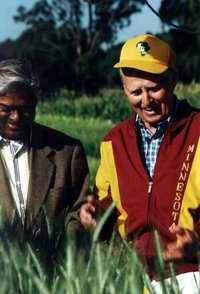October 13, 2005
Norman Ernest Borlaug
Wikipedia has a good writeup on Dr. Norman Borlaug who is reviled by the enviros but who's applied science is directly responsible for saving one billion human lives. Nobel Laureate on top of it all. What's not to love?
Borlaug received his Ph.D. in plant pathology and genetics from the University of Minnesota in 1942. He took up an agricultural research position in Mexico, where he developed semi-dwarf high-yield, disease-resistant wheat varieties.His hypothesis is worth thinking about:
During the mid-20th century, Borlaug led the introduction of his grain and modern agricultural production techniques to Mexico, Pakistan, and India. As a result, Mexico became a net exporter of wheat by 1963. Between 1965 and 1970, wheat yields nearly doubled in Pakistan and India, greatly improving the food security in those nations. These collective increases in yield have been labeled the Green Revolution, and Borlaug is often credited with saving over a billion people from starvation. He was awarded the Nobel Peace Prize in 1970 in recognition of his contributions to world peace through increasing food supply.
More recently, he has helped apply these methods of increasing food production to Asia and Africa. Borlaug has continually advocated the use of his methods and biotechnology to decrease world famine; although his work has faced environmental and socioeconomic criticisms, he has emphatically rejected most of these as unfounded or untrue. In 1986, he established the World Food Prize to recognize individuals who have improved the quality, quantity or availability of food around the globe.
Borlaug has continually advocated increasing crop yields as a means to curb deforestation. The large role he has played in both increasing crop yields and promoting this view has led to it being referred to by agricultural economists as the "Borlaug hypothesis", namely that increasing the productivity of agriculture on the best farmland can help control deforestation by reducing the demand for new farmland. According to this view, assuming that global food demand is on the rise, restricting crop usage to traditional low-yield methods such as organic farming would also require at least one of the following: the world population to decrease, either voluntarily or as a result of mass starvations; or the conversion of forest land into crop land. It is thus argued that high yield techniques are ultimately saving ecosystems from destruction. On a global scale, this view holds strictly true ceteris paribus, provided that all land consists either of forests or is used for agriculture. Because other land uses exist, such as urban areas, pasture, or fallow, further research is necessary to ascertain what land has been converted for what purposes, in order to determine how true this view remains. Increased profits from high yield production may also induce cropland expansion in any case, although as world food needs decrease, this expansion may decrease as well.The "critics" from the environmental trenches:
Throughout his years of research, Borlaug's programs often faced opposition by people who consider genetic cross-breeding to be unnatural or to have negative effects. Borlaug's work has been criticized for bringing large-scale monoculture, input-intensive farming techniques to countries that had previously, but inadequately, relied on subsistence farming, and as widening social inequality owing to uneven food distribution. There are also concerns about the long-term sustainability of farming practices encouraged by the Green Revolution in both the developed and developing world. Other concerns of his critics and critics of biotechnology in general include: the construction of roads in populated third world areas, which could lead to the destruction of wilderness; the crossing of genetic barriers; the inability of crops to fulfill all nutritional requirements; the decreased biodiversity from planting a small number of varieties; the environmental and economic effects of inorganic fertilizer and pesticides; the amount of herbicide sprayed on fields of herbicide-resistant crops.And Borlaug's reaction:
Of environmental lobbyists he has stated, "some of the environmental lobbyists of the Western nations are the salt of the earth, but many of them are elitists. They've never experienced the physical sensation of hunger. They do their lobbying from comfortable office suites in Washington or Brussels. If they lived just one month amid the misery of the developing world, as I have for fifty years, they'd be crying out for tractors and fertilizer and irrigation canals and be outraged that fashionable elitists back home were trying to deny them these things".Posted by DaveH at October 13, 2005 8:37 PM
Comments
Post a comment